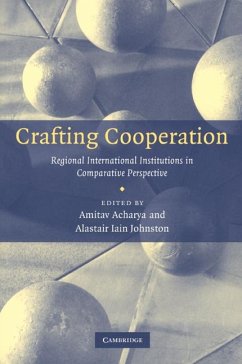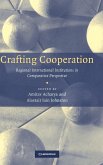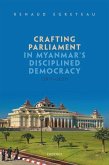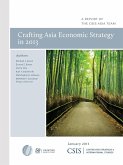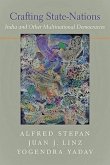Compares the design and effectiveness of regional international institutions.
Regional institutions are an increasingly prominent feature of world politics. Their characteristics and performance vary widely: some are highly legalistic and bureaucratic, while others are informal and flexible. They also differ in terms of inclusiveness, decision-making rules and commitment to the non-interference principle. This is the first book to offer a conceptual framework for comparing the design and effectiveness of regional international institutions, including the EU, NATO, ASEAN, OAS, AU and the Arab League. The case studies, by a group of leading scholars of regional institutions, offer a rigorous, historically informed analysis of the differences and similarities in institutions across Europe, Latin America, Asia, Middle East and Africa. The chapters provide a more theoretically and empirically diverse analysis of the design and efficacy of regional institutions than heretofore available.
Review quote:
'Remarkable, theoretically challenging, and rigorously conceived and researched, this outstanding volume cuts across existing IR theory paradigms to deliver the most cutting edge contribution to date to the comparative study of the design and efficacy of regional international institutions.' Emanuel Adler, Andrea and Charles Bronfman Professor of Israeli Studies, University of Toronto
'This comprehensive collection applies institutional design theory to the analysis of comparative regionalism. It thus enhances and deepens our understanding of an increasingly regional world. Sharp in its three analytical essays and rich in its five empirical case studies, the uniformly excellent chapters make this collection much more than the sum of its parts.' Peter J. Katzenstein, Walter S. Carpenter, Jr. Professor of International Studies, Cornell University
'In this examination of how institutions resolve regional cooperation problems, a top-flight range of authors deploy serious area studies knowledge within a rich and carefully crafted analytical framework. The book should be of a great interest to both general IR scholars and to regional specialists. A winning combination.' Andrew Hurrell, Director, Centre for International Studies, Oxford University
Table of contents:
1. Comparing regional institutions: an introduction Amitav Acharya and Alastair Iain Johnston; 2. Hanging together, institutional design and cooperation in Southeast Asia: AFTA and the ARF Yuen Foong Khong and Helen E.S. Nesadurai; 3. International cooperation in Latin America: the design of regional institutions by slow accretion Jorge I. Dominguez; 4. Crafting regional cooperation in Africa Jeffrey Herbst; 5. Functional form, identity-driven cooperation: institutional designs and effects in post-Cold War NATO Frank Schimmelfennig; 6. Designed to fail or failure of design? The origins and legacy of the Arab League Michael Barnett and Etel Solingen; 7. Social mechanisms and regional cooperation: are Europe and the EU really all that different? Jeffrey T. Checkel; 8. Conclusion: institutional features, cooperation effects and the agenda for further research on comparative regionalism Amitav Acharya and Alastair Iain Johnston.
Hinweis: Dieser Artikel kann nur an eine deutsche Lieferadresse ausgeliefert werden.
Regional institutions are an increasingly prominent feature of world politics. Their characteristics and performance vary widely: some are highly legalistic and bureaucratic, while others are informal and flexible. They also differ in terms of inclusiveness, decision-making rules and commitment to the non-interference principle. This is the first book to offer a conceptual framework for comparing the design and effectiveness of regional international institutions, including the EU, NATO, ASEAN, OAS, AU and the Arab League. The case studies, by a group of leading scholars of regional institutions, offer a rigorous, historically informed analysis of the differences and similarities in institutions across Europe, Latin America, Asia, Middle East and Africa. The chapters provide a more theoretically and empirically diverse analysis of the design and efficacy of regional institutions than heretofore available.
Review quote:
'Remarkable, theoretically challenging, and rigorously conceived and researched, this outstanding volume cuts across existing IR theory paradigms to deliver the most cutting edge contribution to date to the comparative study of the design and efficacy of regional international institutions.' Emanuel Adler, Andrea and Charles Bronfman Professor of Israeli Studies, University of Toronto
'This comprehensive collection applies institutional design theory to the analysis of comparative regionalism. It thus enhances and deepens our understanding of an increasingly regional world. Sharp in its three analytical essays and rich in its five empirical case studies, the uniformly excellent chapters make this collection much more than the sum of its parts.' Peter J. Katzenstein, Walter S. Carpenter, Jr. Professor of International Studies, Cornell University
'In this examination of how institutions resolve regional cooperation problems, a top-flight range of authors deploy serious area studies knowledge within a rich and carefully crafted analytical framework. The book should be of a great interest to both general IR scholars and to regional specialists. A winning combination.' Andrew Hurrell, Director, Centre for International Studies, Oxford University
Table of contents:
1. Comparing regional institutions: an introduction Amitav Acharya and Alastair Iain Johnston; 2. Hanging together, institutional design and cooperation in Southeast Asia: AFTA and the ARF Yuen Foong Khong and Helen E.S. Nesadurai; 3. International cooperation in Latin America: the design of regional institutions by slow accretion Jorge I. Dominguez; 4. Crafting regional cooperation in Africa Jeffrey Herbst; 5. Functional form, identity-driven cooperation: institutional designs and effects in post-Cold War NATO Frank Schimmelfennig; 6. Designed to fail or failure of design? The origins and legacy of the Arab League Michael Barnett and Etel Solingen; 7. Social mechanisms and regional cooperation: are Europe and the EU really all that different? Jeffrey T. Checkel; 8. Conclusion: institutional features, cooperation effects and the agenda for further research on comparative regionalism Amitav Acharya and Alastair Iain Johnston.
Hinweis: Dieser Artikel kann nur an eine deutsche Lieferadresse ausgeliefert werden.
‘In this examination of how institutions resolve regional cooperation problems, a top-flight range of authors deploy serious area studies knowledge within a rich and carefully crafted analytical framework. The book should be of a great interest to both general IR scholars and to regional specialists. A winning combination.’ Andrew Hurrell, Director, Centre for International Studies, Oxford University

